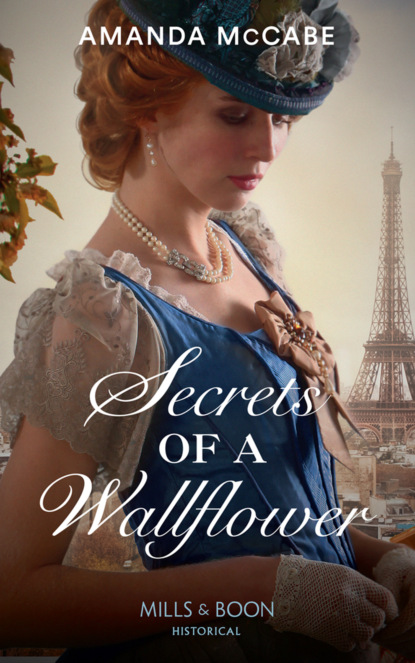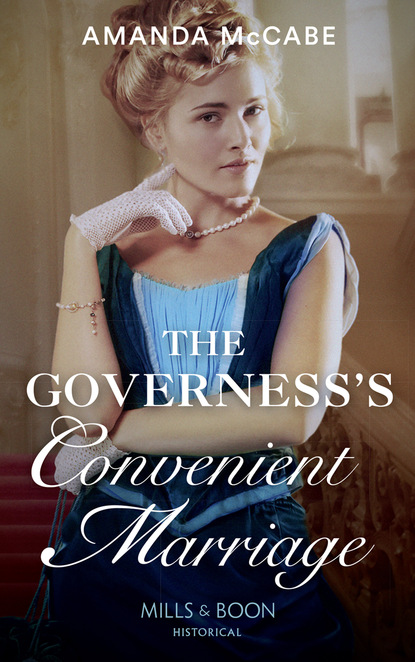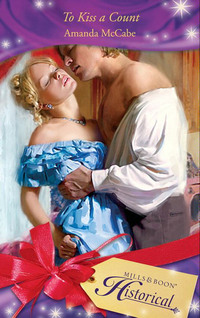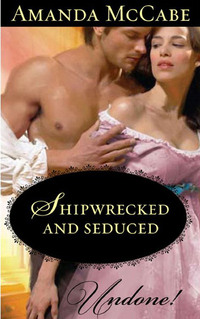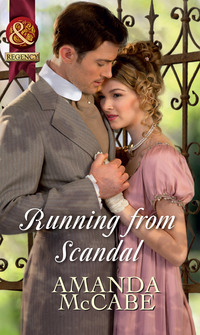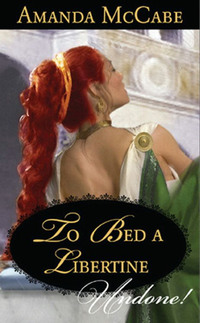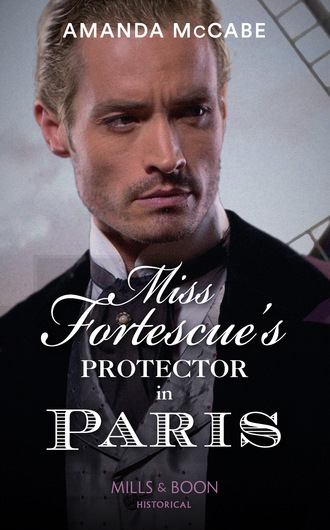
Полная версия
Miss Fortescue's Protector In Paris
‘It was a brilliant idea,’ he said. ‘Cafés in department stores, it’s sure to catch on. In fact, that is something of what I wanted to talk to you about, my dear.’
‘The cafés?’
‘Paris. I had a note from Mr Gordston asking if we could have a meeting soon, to talk about the possible expansion.’
‘Really? I thought the Gordstons were not in the city now. My last letter from Alex was from their country chateau outside Versailles.’ She smiled to think of Alex and how happy she was now with her department-store millionaire husband, adored and pampered, just as she deserved. Emily rather envied her.
‘Yes, it seems they don’t plan to make it back to England any time very soon and I am so caught up in that business with the new spice company out of Madras. I was thinking you could go to Paris in my place. You did such a grand job last year.’
Go back to Paris? Where she’d last seen Chris? Last did such a foolish thing and kissed him in the maze at Lady Rippon’s garden party? Emily turned away as she felt her cheeks turn hot.
Her first instinct was to say no. Paris had such an intoxicating effect on her. But Gordston’s business was very important. And she had heard that Chris was still gadding about the Continent somewhere, doing who knew what. Perhaps he was in Austria with Will and Diana. She would surely not even see him in Paris again.
The butler announced dinner before she could answer and she took her father’s arm to make their way towards the dining room. She glimpsed her mother’s portrait, as she did every night, hanging near the doorway. Maude Fortescue smiled down at her husband and daughter serenely, always young, always perfect. How Emily wished she could ask her advice now!
But she could not. She never could. Growing up without a mother had made her keep her own counsel, find her advice in books and from her friends. That couldn’t change now. But Alex and Diana’s marriages, the way they did something different from most of the women in their world, made her wonder if there could be a way for her, too. Probably not. Will and Malcolm were unique husbands.
The dining room was a grand space, meant for entertaining and impressing business associates. With a long, polished mahogany table lined with blue-and-white-striped satin chairs, the silk-papered walls lined with valuable Old Masters, the sideboard gleaming with silver, it spoke quietly of her father’s success and good taste. But with only herself and her father at dinner, it seemed full of shadows, echoing, empty.
But two places were arranged at one end of the vast table, a cosy oasis of candlelight glowing on the Wedgwood porcelain, the heavy old silver. Their own cosy world, made just for themselves. What would she do one day when there was only one place laid at her table?
‘How lovely it is to get to spend the evening with my beautiful daughter,’ her father said as the footman ladled out the salmon bisque. ‘It is much too rare. You’ve become quite the social butterfly lately!’
Emily laughed. Parties were one way to outrun herself, to be sure. ‘You are the one who always taught me the value of connections, Father. I’m finding future customers wherever I go. You are no slouch in that direction, either. Were you not at the Criterion with Lady Musgrave’s party last week? I am sure I read about it in the paper.’
Albert’s cheeks flushed just a bit above his silvering whiskers and Emily wondered if there was more to the contact with Lady Musgrave than a visit to the theatre and a restaurant. She certainly was a handsome lady, widowed and energetic and cultured. Maybe that was the sort of rest her father needed? A new companion? Where would Emily’s place be, then? Yet she would love her father to find a friend.
‘You are quite right, my dear,’ he said. ‘Connections are all. And Lady Musgrave does serve the best wine in town, her cellar is beyond excellent. I should see about selling her a few cases.’
Emily laughed. ‘See? Always working. But, yes, it is very nice to have a dinner to ourselves.’
The footman brought in the fish course, a trout in lemon sauce. ‘Perhaps a hand of piquet after?’
‘I have to go out after dinner.’
Her father chuckled. ‘Another dance?’
‘Not at all. A meeting of the Women’s Franchise League.’
His laughter turned to a doubtful frown. ‘Not Mrs Hurst’s group?’
‘Yes, of course, Father. She is the president of the League. You know I go every month. It’s most fascinating and her speakers always have such excellent arguments to make.’
‘Emily, I do wish you would not associate with people of such radical and dangerous ideas,’ he scolded. ‘It’s dangerous.’
Emily sighed. They had indeed had such conversations before. She knew her father did not think her or any other educated woman incapable of voting; she knew he had supported the measure quite wholeheartedly when women householders were given the vote in local elections and two were even voted on to the London County Council in 1889. But he disliked tales of riots and arrests at meetings of union leaders and worried such things could happen with the League, as well. It was one of the reasons he was always trying to find a good husband for her, a son-in-law to take care of her and keep her away from such ‘radical’ interests.
But Emily liked what she heard at the meetings, liked not being dismissed for her brains and ambition. She had to believe her mother would have agreed, as well.
‘Oh, Father, I know you do not believe women making their own decisions for their own lives to be radical,’ she said. ‘Have I not done a fine job with you in the business? Have I not a brain and ideas, useful things to offer the world, just like anyone else?’
Her father gave her a gentle smile. ‘I could not have done without you these last few years, Emily, and you know that is true. You’re a natural at the business, my own daughter, but you are your mother’s daughter, as well. I’m afraid I have not reminded you of that often enough.’
‘Oh, Father,’ Emily said softly. ‘I do think of Mama so often. But whatever do you mean?’
‘I mean, you have her kind heart as well as her beauty. You should have your own family to appreciate that.’ It was an argument he made often and one she knew came from his heart.
Emily stared down hard at her plate, trying to swallow past the knot in her throat. Trying not to think about why she had vowed not to marry. ‘You know I don’t wish to wed anyone. Not right now, anyway.’
‘I know you have said that. And it’s quite true I know of no man worthy of my lovely daughter. But there must be someone, someone strong and intelligent and kind, who could possibly come into the business with us.’ He reached out and gently touched her hand. ‘I’m not a young man, Emily. I want to leave everything in capable hands—and not leave you alone.’
‘Oh, Father.’ Emily covered his hand with her own, trying not to cry. ‘You needn’t worry about the business, or about me. I am not alone. I have friends.’
‘Friends like Mrs Hurst and her group?’
‘Yes. And like Diana Blakely and Alexandra Gordston. I am quite well, just as I am, Father. I promise.’
‘Just keep an open mind, Emily. That’s all I ask. Meet new people. Consider the future.’
Emily gave him a reassuring smile, though she didn’t feel at all steady herself. ‘I will, I promise. If you will consider taking a holiday yourself.’
‘A holiday? Why on earth would I do such a thing?’ he scoffed.
‘Maybe go to the seaside. Read books. Go for walks.’ She smiled at him. ‘Maybe Lady Musgrave might enjoy a holiday, as well? You two could go on wine tastings. I do hear Burgundy is lovely this time of year.’
‘Minx,’ Albert said with a laugh. ‘Maybe a holiday isn’t such a bad idea after all. But let’s talk about you and Paris...’
* * *
When Emily left the house after dinner, changed from her silk gown to a tweed walking suit and small felt hat, and journeyed towards the hall where Mrs Hurst and the League met in Pimlico, it had been decided she would go to Paris to see to the Gordston business and her father would take a holiday as soon as she returned. Emily tried to tell herself that it was only a short visit to Paris and Chris was sure to be gone from there. She wasn’t quite sure if the idea was reassuring, or disappointing. Whenever she thought of Paris, she thought of Chris and the kiss they had shared there the last time they were together in the city. The kiss that made her feel so very much it was frightening.
She took her father’s carriage through the city streets, crowded with people making their way to theatres and supper parties, but then sent the coachman away once they arrived at the hall, much to his dutiful chagrin. She promised she would find a ride home from one of the other ladies’ carriages, but she didn’t mention that they would probably go to a coffee house first to talk about suffrage issues. She waited on the pavement until the carriage had rolled out of sight. Then she hoisted the ledgers she kept as the League’s treasurer into her arms and made her way inside.
The League’s headquarters didn’t look like anything remarkable or radical at all from the outside. A plain brick building, narrow and tall, identical to its neighbours, shutters drawn over the windows. There was no sign by the black-painted door, but a small brass bell. Ever since the League’s president, Mrs Hurst, had published a pamphlet titled Is Marriage A Failure?, they had been forced to move a couple of times.
Emily gave the bell three short rings and, after a moment, there was the patter of footsteps, the click of locks and the door swung open. To Emily’s surprise, it was Mrs Hurst herself who stood there.
Short, plump, greying brown hair in a knot atop her head, dressed in a plain shirtwaist and sensible dark blue skirt, no one would take Mrs Hurst for a radical, either. She smiled and reached out to take some of the ledgers. ‘Oh, my dear Miss Fortescue! You are the first to arrive. Do come in. You can help me set up.’
Emily followed her up a narrow flight of stairs and into a small room with a low platform set at one end, faced by rows of chairs. Mrs Hurst handed her a stack of papers to place on each chair, with an article of issues to cover at the meeting: going over the financials, groups sent to seek volunteers in other cities, a roster of speakers at other meetings.
‘I’m sure you have all the figures to present during the budget talks,’ Mrs Hurst said, bustling around setting up more chairs.
‘Oh, yes, of course. We’ve come out rather ahead last month, I’m glad to say.’
‘All because of your hard work, Miss Fortescue! You are quite the most efficient treasurer we have ever had. If you were Minister of the Exchequer, I am sure every problem of the Empire would be quite solved!’
‘I’m afraid I’m not such a whiz as all that,’ Emily said with a sigh. The accounts had never been the most interesting part of business to her, but they were none the less essential. She made her way down the rows, leaving the agendas at each place. ‘I’m not sure we have such a rosy picture for the rest of the quarter, though, unless we can hit on an idea for another fundraiser.’
‘It never is especially rosy,’ Mrs Hurst said, laughing. ‘But I might have a plan to change that, if you’re willing to help.’
‘Of course I am,’ Emily answered, intrigued.
‘I was at the Pankhursts’ At Home in Russell Square last week. Have you been there?’
‘No, but I should dearly like to meet them,’ Emily said. She had heard of Richard Pankhurst, a Liberal M.P., and his wife, who were interested in many causes such as suffrage, and the fascinating people they attracted to their drawing room for evenings of music, refreshments and radical conversation.
‘Oh, you simply must! Richard and Emmeline are the most astonishing people, so open-minded and full of ideas, and simply everyone goes there. I saw Grant Allen last week and that Italian anarchist, Malatesta. Mrs Stanton-Blatch is visiting from America next month. Well, I also met a woman called Madame Renard, who runs an organisation much like our own in Paris. They have faced problems similar to ours, I fear—having the funds to do our work, attracting women of every social station. But she has a few intriguing ideas for raising funds.’
‘What sort of ideas?’
‘It’s a gentleman from Germany she knows, an Herr Friedland. Much associated with the court of Emperor Frederick and his wife, our own Princess Royal still affectionately known as Crown Princess Vicky, of course. The royal couple were very interested in new ideas, in following the English liberalism of the Empress Dowager’s father, much unlike the rest of the German royals, and the Empress Dowager still is interested. Herr Friedland says he can act as liaison with her to set up a sort of roundabout fund for organisations like ours. The Empress Dowager wants to show her support to do so publicly.’
‘Really?’ Emily was intrigued, but rather dubious. The support of people like the Princess Royal would be very valuable indeed, even if it had to be discreet, but how could this man be trusted? So many men would do anything at all to make sure women never had the vote, never had any power. And she knew Germany was a very different place from England. ‘How can we verify his credentials, if it all must be so quiet?’
‘Well, that is where you can come in, my dear Miss Fortescue,’ Mrs Hurst said, practically clapping her hands with enthusiasm. ‘Madame Renard is to meet with Herr Friedland in Paris and has invited us to send someone to take part, to learn how we can all benefit. I cannot go, but I know the matter can be in no more capable hands than yours.’
‘Paris?’ Emily said, astonished. A visit to the city coming up twice in one day—it must be a sign she was meant to be there. ‘I am meant to go there soon anyway, on business for my father, but I don’t know...’
‘Excellent! Then it is meant to be, I’m sure,’ Mrs Hurst cried happily. ‘With enough financing, we can spread our operations to every corner of England at last and ensure freedom to every woman. I will have Madame Renard send you the particulars.’
Before she could ask any more questions, though, the bell rang again and Mrs Hurst dashed down the stairs to let in the others. Emily heard the burst of laughter as the women clattered up the steps and she knew she couldn’t focus now on anything but the important business at hand.
Chapter Three
The streets were quieter than Emily expected when she left her friends at the meeting, and she couldn’t glimpse any hansoms. She glanced at the watch pinned to her tweed lapel and realised it was later than she usually was. But the city was not completely deserted. She still saw a few carriages leaving late, post-theatre suppers, some lingering diners in cafés. So she decided to walk for a time until a hansom came by, a few minutes to clear her head.
After a League meeting, she always felt filled with energy, fizzing away so she could hardly rest. The rightness of what they were working for filled her with such a sense of purpose, of being right where she should be, that it felt as if she was floating in another world entirely from the real one of parties and appointments.
It was just like that when she was absorbed in her work. Or like those moments hidden in the thick green maze with Chris, his lips on hers, all else vanished...
‘No!’ she muttered aloud, stabbing at the pavement with the tip of her umbrella. She wouldn’t think about Christopher Blakely now, not tonight. It was only the idea of being in Paris again that brought him back to her so vividly. Paris had been a magical place and time, so beautiful and sparkling, and Chris had been such a part of it. Just as beautiful and sparkling as the Champs-Élysées itself, lit up at night, and just as illusory.
Yet she couldn’t help but wonder—what was he doing now? Did he ever think about her at all?
‘Don’t be silly,’ she told herself. Of course Chris didn’t think of her. He was too busy doing his Chris-like things: gambling clubs and horse races, theatres. He never had serious thought and he was all wrong for her.
But, oh, he was fun. Handsome and merry, so unlike her own serious self. Yes, she did rather miss him now. Blast him.
Emily heard an echo behind her, a slow, steady sound like a footfall on the paving stones, and she suddenly realised how quiet everything had become. While she was daydreaming, she had turned from the busier lanes of restaurants and hotels to a silent residential street. She stopped and glanced over her shoulder, but could see nothing but shadows in the pale light that fell from a few windows. The echo of footsteps stopped.
A memory flashed through her mind, of Gregory Hamilton and that deserted terrace, of the claustrophobic feeling of not being able to get away. She thought of the strange letters that had recently started to arrive at her house, notes she couldn’t explain, but had dismissed as the ramblings of an overzealous mystery suitor. She shivered and felt the hairs on her arm prickle a bit.
She spun back around, feeling foolish, and hurried ahead, as fast as she dared. The footsteps started again, also moving faster, and as she turned a corner a hand suddenly seized her arm, appearing from the darkness.
She was suddenly caught in her own nightmare, the cobwebs closing around her feet, tripping her as she tried to flee in the darkness.
Using her weight, Emily whirled around towards her attacker instead of trying to pull away. She drew back the hand that held her umbrella and lashed out with it at the shadowy figure.
He just looked like a phantom in the night, featureless, pale, terrifyingly tall and swathed in a black coat, a hat tugged low on his brow to conceal his face. But the iron grip on her arm was all too real.
She screamed and lashed out again with her umbrella. He muttered a low, rough curse and tried to grab her other arm as she landed a lucky blow to his skull. She screamed again, desperately, and tried to bring her boot-heel down on his foot.
A window somewhere along the street opened and someone called, ‘Here, what’s this about? Leave off or I’ll call on the constables, right now!’
As if startled, her attacker suddenly released her and fell back a step. Emily broke away and started running, as fast as she could. It had been a long time since her days of chasing tennis balls and rowing on the pond at Miss Grantley’s, but she could still move like the wind when she needed to. She didn’t stop until she somehow reached her own front door and she pounded her fists on it frantically.
She stumbled inside when the butler opened it and only then did she feel the ache in her struggling lungs, the pain in her legs. He stared at her in astonishment as she collapsed on the nearest chair.
‘Miss Emily,’ he said. ‘Whatever is the matter? Are you ill?’
Emily shook her head, gasping too hard to say anything. She wanted to beg him not to alert her father, but it was too late. Albert had already appeared at the top of the stairs in his dressing gown, his face creased with worry.
‘Emily,’ he cried, hurrying down to her side. Mary appeared behind him, her face shocked. ‘Fetch a doctor right away!’
‘No, I don’t need a doctor,’ Emily managed to say hoarsely. ‘I just had a bit of a fright, that’s all.’
‘Oh, Miss Emily, was it him? The letter writer?’ Mary gasped. ‘I knew he would show up!’
‘Him?’ Emily’s father said sharply.
Emily shot Mary a reproachful glance, but she didn’t blame the maid, not really. When Emily had confided in Mary about the notes, they had both determined it was probably just an overzealous suitor. Emily had begged Mary not to say anything, not to worry her father, and surely the letters would stop soon enough. Mary had agreed, but had they been very wrong after all?
‘I’ll just fetch a brandy, Miss Emily,’ Mary said, and she and the butler hurried away.
Albert sat beside Emily and gently took her hand. She felt steadier already, being in her own home with her father, and anger was beginning to replace the fear. ‘Emily, what does Mary mean? Was someone pestering you tonight? Someone you have had problems with before?’
Emily shook her head. ‘Someone was following me, I think, and I did receive one or two letters recently—very, um, affectionate letters. From someone nameless. But I am sure they are not connected.’
Albert looked shocked, his face turning red. ‘I never should have let you go alone to that blasted meeting! If only your mother were here. She would have known what to do.’
Emily held tightly to his hand. ‘It has nothing to do with the meeting, Father, I’m sure of it. It happened long after I left the hall. I was just being silly, distracted by a daydream. I will always take the carriage from now on, I promise.’
Mary returned with a glass of brandy and Emily took a bracing gulp of the amber liquid, glad of its steadying warmth.
‘Well, Paris is out of the question now,’ her father said.
‘Oh, no, Father,’ Emily argued. ‘We can’t let one strange incident get in the way of our business. I swear to you, I will be much more careful in the future.’ And the letter-writer, and that night’s follower, if they were indeed one and the same, could never be allowed to interfere in what really mattered: her work.
Her father looked as if he very much wanted to argue with her, but he just shook his head and patted her hand. ‘We will talk about it tomorrow, my dear. You look exhausted. Let Mary take you up to bed now. You need some rest.’
Emily nodded. She was exhausted, but she feared she wouldn’t find quiet sleep that night. She let Mary lead her up to her chamber, brush her hair and help her into her nightdress. The maid stayed beside her, reading from a book of poetry, as Emily climbed into bed. She closed her eyes and for a moment the fearful image of the dark alley wasn’t there at all. Instead she saw a sunny French garden, Chris’s teasing smile as he kissed her in that garden maze, and she was able to drift into slumber.
* * *
Albert Fortescue glanced through the darkened doorway at his peacefully sleeping daughter. In her slumber, she looked younger, serene, all the cares of the day, her endless energy, still for the moment. It reminded him of when she was a little girl and he would read her a bedtime fairy story, tuck her in before he went off to a dinner party or the theatre. Those quiet, precious moments, gone much too quickly.
But what wasn’t gone, what would never be gone, was his need to protect her. To keep her safe. He had promised Emily’s mother, as she lay dying, that their daughter would always be safe. Now he feared he was failing in that vow.
He remembered with an anguished pang the frightened look on her face earlier and the anger that anyone would dare treat her like that. His Emily, his precious girl!
Albert knew he had not raised her as most girls were. But how could he have done differently? He had been on his own for most of their life together. Emily had no mother, no aunt, no grandmother to guide her. Perhaps he should have married again, given her a stepmother, but the business took all his time. They had seemed to do well, the two of them, and his Emily was so smart, so full of energy, so independent. She was a true assistant in his work.
Yet he was not as young as he had once been. He could feel his own strength flagging and one day, perhaps much sooner than he could have wished, he would have to cease working so much. It was time to organise, once and for all, things he had put off for too long.
Emily needed a protector, someone to stand by her side in life. A husband who could give her a secure place in society, give her a family so she would never be alone and perhaps take over the reins of his business once he could no longer do it. She needed someone—before it was too late. The danger she’d run into that night only proved that to him.
Albert sighed and ran a hand over his face as weariness and worry washed over him. How to convince Emily of this urgency? Every time he thought he had found a proper suitor for her, his darling, headstrong girl turned her nose up at them! She always had an argument against them and he would never want to see her with someone she could not love. Someone she could love as he had once so loved her mother.


